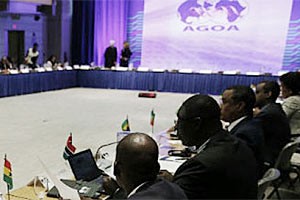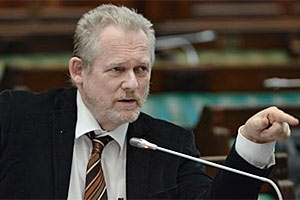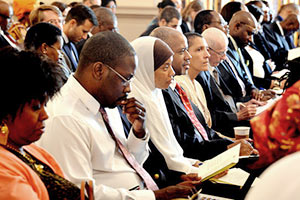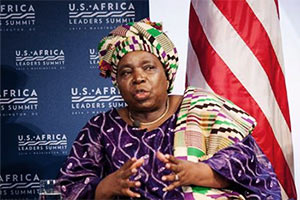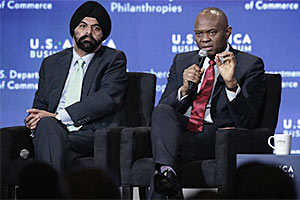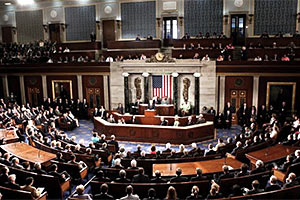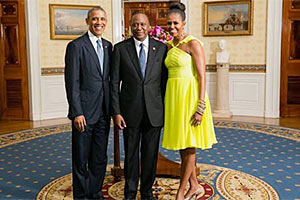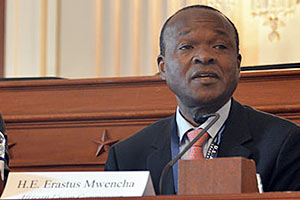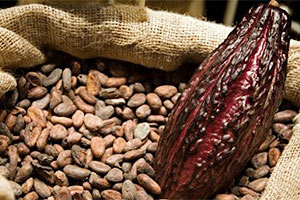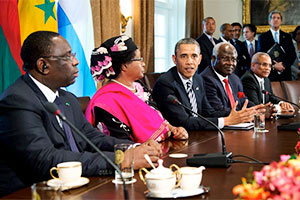14 years of AGOA: Why no real Africa intra-trade?
When President Bill Clinton signed the African Growth Opportunities Act (AGOA) into law 14 years ago, he offered incentives for African countries to open their economies and build free markets, to move the continent from an aid dependency to a viable trading partner.
That is why at their summit hosted by US President Barack Obama in Washington, 50 African heads of states, including our own President Jacob Zuma, smilingly reminisced about how AGOA has led directly and indirectly to the creation of millions of jobs, thus significantly contributed to economic growth, social stability and poverty alleviation in Africa, thanks to rising exports of textiles and apparels.
As a journalist covering the US, 14 years ago I attended the passing of the AGOA legislation in the US Congress. I was there when President Clinton signed it into law. I have heard how AGOA has been an "unqualified success" in helping to stimulate and expand the U.S.-Africa trade relationship and still have much untapped potential.
No wonder our leaders sing praises to three successive US administrations, including President Barack Obama’s administration, for having actively maintained AGOA in close cooperation with African partners.
While we should all embrace AGOA, our leaders should continuously innovate and ask whether the remarkably generous trade concessions are having the desired effect of shifting African aspirations to more trade, through controlled access to the vast US market.
For me the biggest question is why are African countries not so enthusiastic about trade partnerships among themselves but are so eager to do business with the US, Japan and China. To be exact, why is there no clearly defined and seamless intra-African trade?
Let me briefly look at AGOA’s benefits and challenges before taking African leaders to task for not trading with themselves.
Indeed, AGOA has led to a significant increase in two-way trade between the US and Africa by encouraging the diversification of Africa's trade with the US. We have seen an increase in non-oil trade and US exports to Africa have also grown.
According to the AGOA.info website, U.S. imports from AGOA countries have grown from $8.2 billion in 2001 to $26.8 billion in 2013, a threefold increase. Non-oil AGOA trade has increased almost fourfold during the same period from $1.4 billion to almost $5 billion. The AGOA officials figures say US. direct foreign investment (FDI) stock in sub-Saharan Africa has also increased from approximately $9 billion to $35 billion. And according to the African Coalition on Trade, AGOA-related investment has resulted in the creation of some 300,000 jobs in sub-Saharan Africa and almost 120,000 jobs in the United States.
It is all good. After all, for decades the US has provided billions to Africa in aid, yet Africa is the only region of the world that is getting poorer. This is proof that aid just cannot get you the results that trade can. That is just a fact.
If you look at any region of the world, there is not any region that has developed without entrepreneurs developing the private sector in those countries. As Africans, we must be thankful of AGOA.
AGOA has its critics. They say it is a waste of time and money, that its benefits are almost completely confined to the oil and gas industry and that it has done little to grow African non-oil economies, nor helped. The critics lament that petroleum products continue to account for the largest portion of US imports from Agoa countries.
To me AGOA has accomplished all it can in its current form and the focus must now shift to capacity building so that countries can take advantage of the US market.
Now let us hope that as AGOA enters its 15th year, our leaders will take AGOA to a new level with innovative ideas, otherwise AGOA will soon become wallpaper.
Despite AGOA’s achievements, my biggest gripe is that why can’t we as Africans have our own AGOA. While trade relations with the US and other countries are important, how much African countries trade with each other is crucial to the integration and development of the continent.
The statistics on intra-African trade in comparison with other regions tell a sorry story. According to the United Nations Economic and Social Council's Economic Commission for Africa, only 10 percent of African countries trade with each other. In comparison, 40 percent of trade from North America is done with other North American countries. That figure rises to 63 percent when looking at trade between European Union countries.
There is no doubt that there is a great potential in intra-African trade. Why are our leaders not putting their energy to achieve this potential?
Indeed, the reasons for the lack of trade between African countries are numerous. Corruption, onerous rules, infuriating red tape, infrastructure problems (poorly developed or maintained roads, as well as numerous road blocks and check points), high tariffs between countries, and lack of a coherent, unified payment system to facilitate trade, difficulty in harmonising polices for the benefit of Africans, security challenges, particularly from Al-Shabaab and Boko Haram sects and many other stumbling blocks.
For example, according to the World Bank’s Doing Business, In Swaziland, it takes 12 procedures and 56 days to start a company, In Niger, it takes 326 days to build a warehouse. In Senegal, it takes 43 procedures and more than two years to enforce a legal claim. Some of the otherwise most impressive countries in Africa undermine themselves with their political repression.
Our leaders must realise that the real key to raising living standards is economic growth. And growth, in turn, is highly correlated with trade openness. One World Bank study showed that poor countries whose trade grew as a share of the economy recorded gains in income of 5 percent per year. By contrast, poor countries whose trade did not expand had no income gains whatever.
For me this proves that globalisation remains a worldwide convergence of supply and demand. More countries want the benefits of foreign trade, investment and technology; and multinational firms - desperate for new markets - supply these benefits. An open world economy requires more - not fewer - trade agreements, because more commerce than ever is global. The prospect of more trade shouldn't be frightening as it looks like our African leaders believe.
The case for intra-African trade is overwhelming, both theoretically and empirically. Even if the people of a country have an absolute advantage in producing everything, they still gain from foreign trade because they cannot have a comparative advantage in producing everything.
Ample evidence backs up the theoretical arguments in favour of intra continental trade. The more countries permit international trade to direct their productive efforts into their comparative advantages, the more they prosper relative to those that restrict trade. Despite this evidence, almost no African country has followed a policy of free trade.
I know that the African Union (AU) recognises the benefits of economic integration. The AU has endorsed the formation of a Continental Free Trade Area (CFTA) in a bid to boost trade among countries on the continent, a promising future that will significantly improve African economy and integration process.
Don’t tell me about the New Economic Plan For Africa's Development, Nepad. It is an enigma. That is why to some of us, Nepad is nothing but a talk shop. It is not clear what it has achieved since its founding years ago.
Of course there are some regional economic blocs such as the East African Community (EAC), Economic Community of West African States (ECOWAS), Common Market for Eastern and Southern Africa (COMESA), Southern Africa Development Community (SADC), among others. However, the efforts of realizing economic integration are hindered by intra-country hatred, jealousy, red tapes, regional turf wars, let alone protectionism.
Let us broaden the distribution of wealth through African intra-trade if for no other reason than to avoid the extremism of an Africa of growing haves and have nots.
Happy 14th anniversary AGOA. Let us hope that our leaders remember that there is a real opportunity for an AGOA-type initiative among African countries.
Rich Mkhondo was correspondent for Independent Newspapers based in Washington from 1996 to 2000. He runs The Media and Writers Firm (www. Mediaandwritersfirm), a content development agency and reputation management consultancy.


